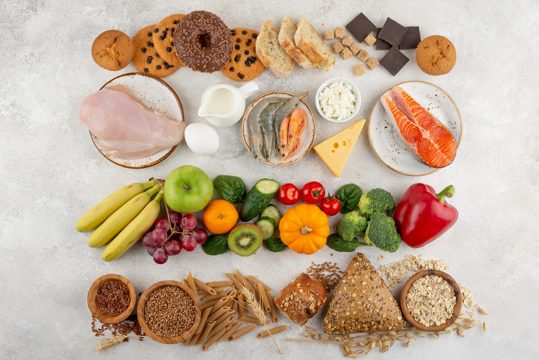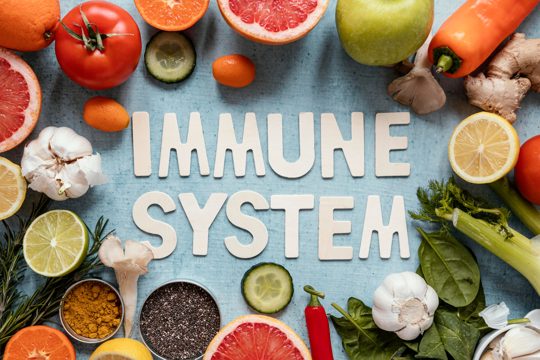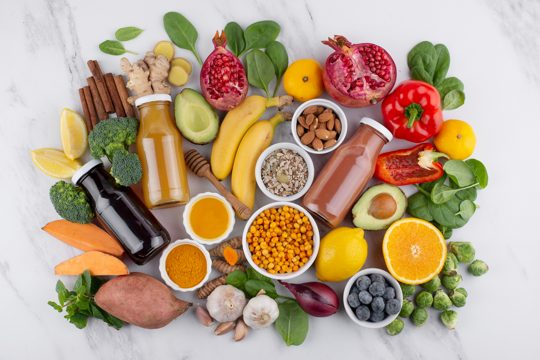Anti-inflammatory Diet: What to Know
An anti-inflammatory diet is a meal plan designed to reduce levels of inflammation in the body. By following this dietary path, you can fight off inflammation and reduce the risk of chronic diseases like heart disease, diabetes, and obesity.
An anti-inflammatory diet isn't merely a meal plan, it's a holistic approach to eating that's meticulously crafted to mitigate inflammation levels within the body. This diet is a treasure trove of nutritious foods that not only tantalize your taste buds, but also work harmoniously to combat the harmful effects of inflammation. It's a dietary path that is resplendent with a diverse array of wholesome foods like colorful fruits, leafy vegetables, protein-rich legumes, and heart-healthy fats that collectively aim to bolster your body's natural defenses and ensure optimal health. The remarkable benefit of this diet is its potential to ward off inflammation, a common culprit behind several persistent health issues. Chronic inflammation, if left unchecked, can wreak havoc on your health and pave the way for life-threatening diseases.

But fear not! By adhering to this targeted dietary approach, you can significantly reduce the risk of chronic diseases such as heart disease, diabetes, and obesity. This diet is not just a quick fix, but a sustainable lifestyle choice that encourages mindful eating.
It's about selecting foods that are not only delicious but also have the power to nourish the body and fortify it against disease. So, if you're seeking a diet that can improve your health and well-being, while also offering a smorgasbord of delightful flavors, the anti-inflammatory diet is an excellent choice. Embark on this culinary journey and reap the multifaceted benefits it offers, and you'll soon discover that this isn't just a diet, it's a way to a healthier, happier life.
What is an anti-inflammatory diet?
An anti-inflammatory diet is a pattern of eating that includes foods known for their ability to fight inflammation in the body. Its not a diet in the traditional sense; instead, its a lifestyle choice that promotes the consumption of whole, nutrient-dense foods.
An anti-inflammatory diet is not just a mere pattern of eating; it's an exciting journey into a world of foods known for their remarkable ability to combat inflammation within the body. This unique dietary approach is a vibrant tapestry of whole, nutrient-dense foods, each carefully selected for their inflammation-fighting properties. It's a fascinating exploration of a myriad of foods in all their colorful variety, bursting with flavors that are as diverse as they are beneficial to your health. This isn't a diet in the traditional, restrictive sense. Quite the contrary, it's a liberating lifestyle choice that promotes and encourages the consumption of an abundance of whole foods, packed full of essential nutrients. Think of it as a culinary adventure where every meal nourishes your body and combats inflammation.

You're not just eating; you're taking active strides towards a healthier you. Ultimately, an anti-inflammatory diet is about more than just food.
It's about making conscious decisions that contribute positively to your overall well-being. It's about understanding the profound impact that our diet can have on our bodies, and harnessing the power of nature's pantry to foster good health. It's a celebration of food in its purest form, and a commitment to nourishing ourselves in the most beneficial way possible. Embrace this lifestyle choice, and enjoy the journey to a healthier, happier you.
Types of anti-inflammatory diet
There are several types of anti-inflammatory diets. The Mediterranean diet, which emphasizes fruits, vegetables, lean protein, nuts, seeds, and healthy fats, is an example.
The DASH (Dietary Approaches to Stop Hypertension) and the MIND (Mediterranean-DASH Diet Intervention for Neurodegenerative Delay) diets also have anti-inflammatory properties. In the diverse world of nutrition, numerous anti-inflammatory diets have emerged, each with a unique focus and distinctive benefits. Among these, the Mediterranean diet is an exceptional example. This lifestyle-oriented diet is renowned for its emphasis on a variety of fresh fruits and vegetables, lean proteins such as fish and poultry, a diverse range of nuts and seeds, and the heart-healthy fats found in olive oil and avocados. This diet is not just about the food, but it's also about enjoying meals with family and friends, enjoying a glass of red wine, and getting plenty of exercise. Next in line is the DASH diet, an acronym for Dietary Approaches to Stop Hypertension. This diet was designed specifically with the aim to lower high blood pressure. It encourages the intake of whole grains, fruits, vegetables and low-fat dairy products, and it recommends cutting back on foods high in saturated fats, cholesterol, trans fats, sweets, sugary drinks and sodium.

This diet is not only good for your heart, but it also has anti-inflammatory properties that can help reduce chronic inflammation in your body. The MIND diet, on the other hand, is a beautiful blend of the Mediterranean and DASH diets.
It stands for Mediterranean-DASH Diet Intervention for Neurodegenerative Delay, and it's designed to prevent dementia and loss of brain function as you age. The MIND diet recommends eating from 10 brain-healthy food groups: green leafy vegetables in particular, all other vegetables, nuts, berries, beans, whole grains, fish, poultry, olive oil and wine. It also has anti-inflammatory properties that can help protect against certain diseases. In a nutshell, these diets offer far reaching health benefits beyond just their anti-inflammatory properties. They can lower your risk for chronic diseases, improve brain health, aid weight loss and even promote longevity. So, if you're seeking a healthy, balanced approach to eating, these diets could be the perfect fit for you.
Who can it help?
An anti-inflammatory diet can help anyone looking to improve their overall health. Its particularly beneficial for individuals with chronic inflammatory diseases like rheumatoid arthritis, psoriasis, and inflammatory bowel disease.
It can also help those at a high risk of developing heart disease or stroke. Embarking on an anti-inflammatory diet journey could be a game-changer for anyone striving to enhance their overall health and wellbeing. In simple terms, this diet is a meticulously planned, nutrient-dense culinary approach that aims to combat inflammation. It's a veritable cornucopia of fruits, vegetables, lean proteins, and healthy fats, all put together to counteract inflammation in our bodies. It's the perfect blend of nature's best offerings, served on a platter, to keep you healthy, vibrant, and full of life. This diet is especially beneficial for those grappling with chronic inflammatory diseases. If you're battling conditions like rheumatoid arthritis, where your joints are persistently inflamed, causing pain and discomfort, or psoriasis, a skin condition marked by red, itchy, scaly patches, an anti-inflammatory diet could provide much-needed relief. Similarly, those diagnosed with inflammatory bowel disease, a group of inflammatory conditions of the colon and small intestine, can also benefit from this diet.

It's designed to soothe, nourish, and heal, reducing inflammation and symptoms, thereby enhancing the quality of life. Moreover, an anti-inflammatory diet isn't just for those who are trying to manage existing conditions.
It's also an invaluable tool for those at a high risk of developing heart disease or stroke. These ailments, often life-threatening, are directly linked to inflammation in the body. By adopting this diet, you're essentially taking proactive measures to safeguard your health. You're arming your body with the necessary nutrients to fight off potential threats, thereby reducing the likelihood of succumbing to such ailments. It's like a preventive shield, a beacon of hope, guiding you towards a healthier, more fulfilling life. In conclusion, the anti-inflammatory diet isn't merely a diet; it's a lifestyle change, a commitment to your health, and a pledge to live better. It's a path that leads to a more balanced, healthier you, brimming with vitality and longevity.
Foods to eat
Foods to eat on an anti-inflammatory diet include fruits and vegetables, whole grains, lean protein (such as chicken and fish), nuts, seeds, and healthy fats like olive oil. Also, spices like turmeric and ginger have been shown to have anti-inflammatory properties.
When embarking on an anti-inflammatory diet journey, it becomes essential to incorporate a rainbow of fruits and vegetables into your daily regime. Not only do they provide a plethora of necessary vitamins, minerals, and antioxidants, but they also serve as a delicious way to keep meals exciting and diverse. From juicy berries and crunchy apples to leafy greens and vibrant bell peppers, the array of options is vast and appetizing. Whole grains are another critical component of an anti-inflammatory diet. They are a powerhouse of nutrients, rich in fiber, which aids in digestion, and contain essential elements like magnesium, iron, and selenium. Popular choices include brown rice, quinoa, oats, and whole wheat, which can easily be integrated into meals, from breakfast cereals to hearty dinner dishes. Lean proteins such as chicken and fish are also recommended. They are a fantastic source of essential amino acids, which are the building blocks of cells and tissues. Opt for grilled or baked fish like salmon or mackerel, which are also high in omega-3 fatty acids, known for their anti-inflammatory properties. Chicken, especially skinless chicken breast, can be a great lean protein choice, versatile for a variety of dishes.

Don't forget to sprinkle in some nuts and seeds, which pack a punch when it comes to anti-inflammatory benefits. Almonds, walnuts, flaxseeds, and chia seeds are nutrient-dense, providing healthy fats, fiber, and a variety of vitamins and minerals.
They make for perfect mid-day snacks or can be added to salads, yogurts, and smoothies for extra crunch and flavor. Healthy fats, particularly those found in olive oil, are a cornerstone of an anti-inflammatory diet. Olive oil contains monounsaturated fats and antioxidants, which help reduce inflammation and promote heart health. Drizzle it over salads, use it for cooking, or mix it into sauces and dressings to enhance flavor and health benefits. Lastly, spices like turmeric and ginger are not just flavor boosters, but they also come loaded with anti-inflammatory properties. Turmeric contains curcumin, a compound known for its potent anti-inflammatory and antioxidant effects, while ginger has been widely used in traditional medicine for its soothing and anti-inflammatory properties. Experiment with these spices in your cooking to add not only a kick of flavor but also a boost of health benefits. In conclusion, an anti-inflammatory diet doesn't have to be restrictive or dull; instead, it can be a delicious exploration of nutrient-dense foods that promote overall health.
Foods to avoid
Foods to avoid on an anti-inflammatory diet include processed foods, sugary drinks, and foods high in trans fats and saturated fats. These food choices can increase inflammation and lead to chronic diseases.
When embarking on an anti-inflammatory diet, it's crucial to steer clear of certain foods that are known to exacerbate inflammation and potentially contribute to the development of chronic diseases. Topping this list are processed foods - those items that contain artificial additives or have been chemically altered from their natural state. These products often contain harmful substances and lack the essential nutrients our bodies need to fight inflammation effectively. Next on the list are sugary drinks, which are not just sodas, but also include many fruit juices, energy drinks, and even some types of coffee and tea. Excessive sugar intake can trigger an inflammatory response in the body, and studies have linked it with a host of health issues, including obesity, diabetes, and heart disease.

It's therefore a wise choice to replace these with water, herbal teas, or natural fruit-infused waters. Lastly, foods high in trans fats and saturated fats should be avoided.
These types of fats, often found in fried foods, baked goods, and fast food, can raise your bad cholesterol levels, leading to inflammation, and increase your risk of heart disease. Replacing these with healthy fats like those found in avocados, nuts, and fish can help reduce inflammation and promote overall health. In summary, embarking on an anti-inflammatory diet isn't just about adding beneficial foods to your meals; it also involves making conscious choices to avoid certain harmful foods. By eliminating processed foods, sugary drinks, and foods high in trans and saturated fats, we can help our bodies to better manage inflammation and potentially stave off chronic diseases.
Can a vegetarian diet reduce inflammation?
Yes, a vegetarian diet can reduce inflammation. Many plant-based foods are high in anti-inflammatory compounds, and a vegetarian diet is typically low in foods that can promote inflammation, such as processed meats and high-fat dairy products.
Absolutely! Embracing a vegetarian diet can significantly help to diminish inflammation in the body. The beauty of vegetarian cuisine lies in its diversity of nutrient-dense food choices that are brimming with potent anti-inflammatory properties. Many of these plant-based powerhouses, such as dark leafy greens, whole grains, nuts, seeds, and colorful fruits, are naturally high in antioxidants and phytochemicals, which are known to combat inflammation. They also contain essential vitamins and minerals that support overall health and well-being. Furthermore, a well-balanced vegetarian diet tends to be naturally low in foods that have been associated with promoting inflammation.

This includes processed meats like sausages and hot dogs, and high-fat dairy products like cheese and butter. Processed meats, in particular, are often packed with preservatives and additives, which can potentially trigger inflammation in the body.
On the other hand, high-fat dairy products are rich in saturated fats, which are known to increase inflammation when consumed in excess. By choosing a vegetarian diet, you're not only reducing your intake of these inflammatory foods, but you're also significantly increasing your consumption of a wide array of inflammation-fighting, plant-based foods. This dietary shift can provide a multitude of health benefits, including improved heart health, better digestion, enhanced immune function, and of course, reduced inflammation. It's a win-win situation for your health and the environment!.
Anti-inflammatory diet tips
Tips for following an anti-inflammatory diet include eating a variety of fruits and vegetables, choosing whole grains over refined grains, limiting processed foods, and incorporating more plant-based proteins and healthy fats into your meals. Embracing an anti-inflammatory diet can be a game-changer for your health, and it's simpler than you might think.
The key is to flood your plate with an abundance of colorful fruits and vegetables. They're packed with antioxidants and other essential nutrients that help reduce inflammation and boost your immune system. Try to incorporate a variety of types, from leafy greens to berries, to ensure you're getting a wide spectrum of nutrients. Additionally, make the smart switch from refined grains to whole grains. Whole grains like brown rice, oatmeal, and whole wheat bread are rich in fiber, which aids digestion and keeps you feeling full longer. They're also packed with B vitamins, iron, and other minerals that contribute to your overall well-being. Processed foods may be convenient, but they're often high in sugars, unhealthy fats, and artificial ingredients, which can trigger inflammation. Try to limit your intake of these foods and focus more on fresh, whole foods.

This doesn't mean you have to eliminate these foods completely; just make more conscious choices about what you're putting into your body. Finally, try to incorporate more plant-based proteins and healthy fats into your meals.
Foods like lentils, chickpeas, and quinoa are great sources of protein and are also rich in fiber and other nutrients. Healthy fats, like those found in avocados, nuts, and seeds, are essential for brain health and can help reduce inflammation. So, don't shy away from these foods - they can be a delicious and nutritious part of your anti-inflammatory diet. In essence, an anti-inflammatory diet isn't just about what you shouldn't eat, but more about embracing a variety of nutrient-dense foods that can contribute to better health and well-being. It's a positive lifestyle choice that can help you feel healthier, more energetic, and even improve your mood. So go ahead, dive into this healthy way of eating and discover the plethora of benefits it offers.
Takeaway
An anti-inflammatory diet can help reduce inflammation and lower the risk of chronic diseases. It involves consuming a variety of nutrient-dense foods and avoiding those that can trigger inflammation.
While anyone can benefit from an anti-inflammatory diet, its particularly beneficial for those with chronic inflammatory conditions or those at a high risk of heart disease or stroke. Delving into the world of an anti-inflammatory diet can open up an exciting array of options that not only tantalize your taste buds, but also foster better health and wellbeing. This diet, centered around the consumption of nutrient-dense foods, offers a holistic approach to wellness that aims to combat inflammation, a common factor in many chronic health conditions. By focusing on the intake of wholesome foods, such as fruits, vegetables, lean proteins, nuts, seeds, and healthy oils, this diet fosters a healthier body, inside and out. Moreover, this diet places emphasis on avoiding foods that can potentially trigger inflammation, such as processed foods, sugary snacks, and excessive amounts of red meat.

This doesn't necessarily mean completely eliminating these foods from your life, but instead being more mindful of your consumption, and opting for healthier alternatives whenever possible. This balanced view on dieting can make the anti-inflammatory lifestyle more approachable and sustainable in the long run.
While this diet can provide health benefits to virtually anyone, it holds particular significance for those suffering from chronic inflammatory conditions, or those who are at a heightened risk of heart disease or stroke. In these cases, an anti-inflammatory diet could potentially be a game-changer, helping to manage symptoms, reduce risk, and improve overall quality of life. Indeed, by adopting an anti-inflammatory diet, you're not just changing what's on your plate, but you're also taking a proactive step towards a healthier, vibrant future.
About us
Welcome to HealsHub! Your go-to source for all things related to health and wellness! We're here to help you lead a healthier, happier life by providing you with the latest news, research, and advice on topics like nutrition, fitness, mental health, and more. Our mission is to empower you to take control of your health and well-being through education and inspiration. Whether you're looking to lose weight, build muscle, manage stress, or simply learn more about how your body works, you'll find everything you need right here on healshub.com. We believe that everyone deserves to live a healthy, fulfilling life, and we're committed to providing you with the tools and resources you need to achieve your goals. So take a look around, explore our articles and resources, and start your journey towards better health today!

